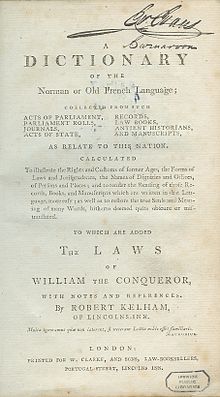Law French
This includes many words which are of Latin origin, but whose forms have been shortened or distorted in a way which suggests a long history of French usage.
Law French remained in use for the 'readings' (lectures) and 'moots' (academic debates), held in the Inns of Court as part of the education of young lawyers, but it rapidly became only a written language.
By about 1500, gender was often neglected, giving rise to une home ('a (feminine) man') or un feme ('a (masculine) woman').
In the seventeenth century, the moots and readings fell into neglect, and the rule of Oliver Cromwell, with its emphasis on removing the relics of archaic ritual from legal and governmental processes, struck a further blow to the language.
A frequently quoted example of this change comes from one of Chief Justice Sir George Treby's marginal notes in an annotated edition of Dyer's Reports, published 1688: Richardson Chief Justice de Common Banc al assises de Salisbury in Summer 1631 fuit assault per prisoner la condemne pur felony, que puis son condemnation ject un brickbat a le dit justice, que narrowly mist, et pur ceo immediately fuit indictment drawn per Noy envers le prisoner et son dexter manus ampute et fix al gibbet, sur que luy mesme immediatement hange in presence de Court.
"Richardson, Chief Justice of the Common Bench at the Assizes at Salisbury in Summer 1631 was assaulted by a prisoner there condemned for felony, who, following his condemnation, threw a brickbat at the said justice that narrowly missed, and for this, an indictment was immediately drawn by Noy against the prisoner and his right hand was cut off and fastened to the gibbet, on which he himself was immediately hanged in the presence of the Court.
